Duration:
7 months
Campus Availability:
- Tulsa, OK
- Jacksonville, FL
- Houston, TX
- Dallas Metro (Irving), TX
Upcoming Start Dates:
Jul. 11, 2025 & Aug. 8, 2025
START TRAINING TO BE AN ELECTRICIAN TODAY
The Electrical Applications program at Tulsa Welding School (TWS) trains students in hands-on courses, guided by expert instructors, for one purpose: to prepare them for job opportunities as an entry-level electrician.
This in-depth electrician program teaches students about the applications and fundamentals of mechanical and electrical principles, wiring systems, and more.
Residential, commercial and industrial electrical industries are looking for workers. Will you be one?
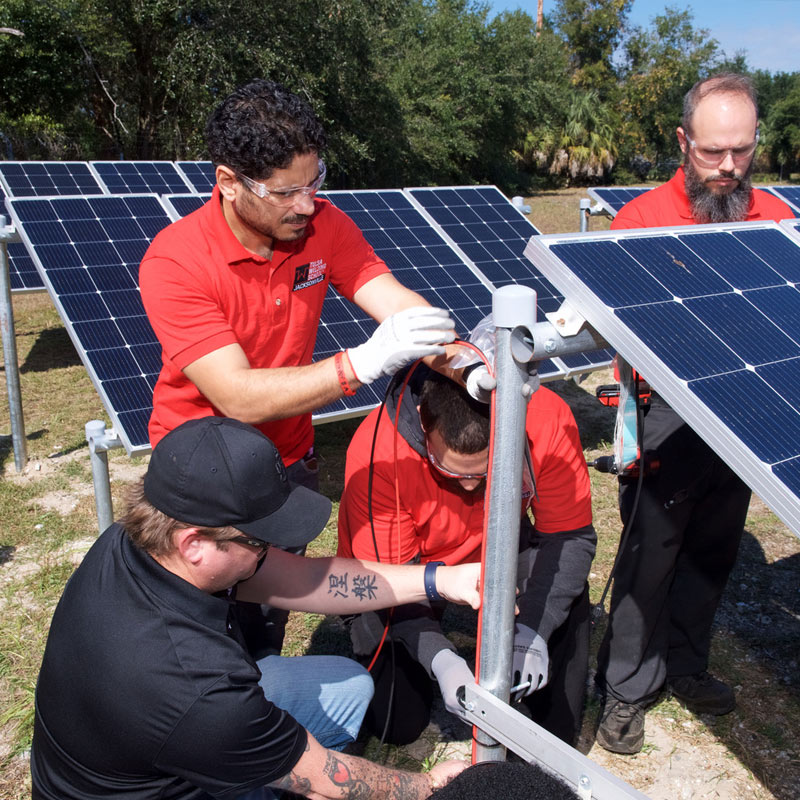
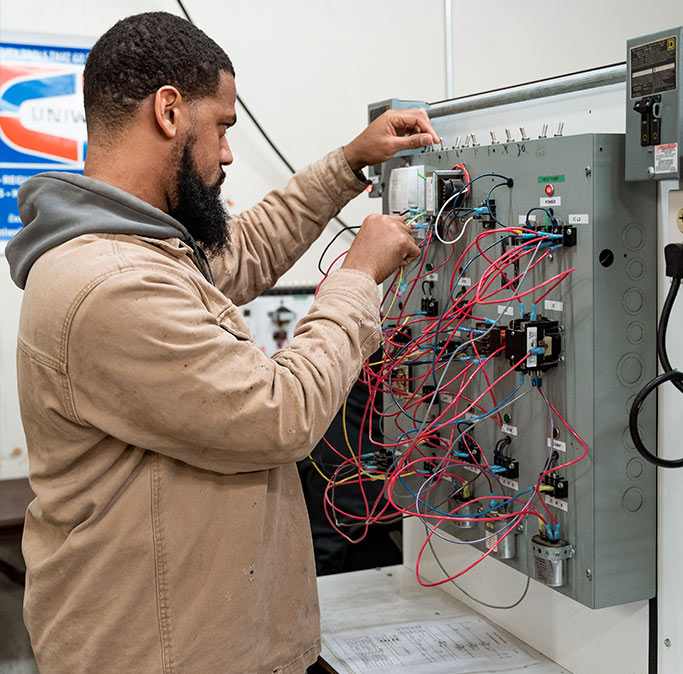
Find Opportunities for Entry-Level Electrician Jobs
The electrician training you’ll receive at TWS will empower you with the skills, knowhow, and hands-on experience needed to maintain and service residential, commercial, and industrial electrical equipment.
The Electrical Applications program is available at our Jacksonville, Florida, Tulsa, Oklahoma, and Houston, Texas campuses and can be completed in as little as seven months. You’ll be prepared to pursue career opportunities such as:
- Service Electrician
- Commercial Lighting Technician
- Industrial Control Technician
- Electrical Systems Technician
- Preventive Maintenance Electrician
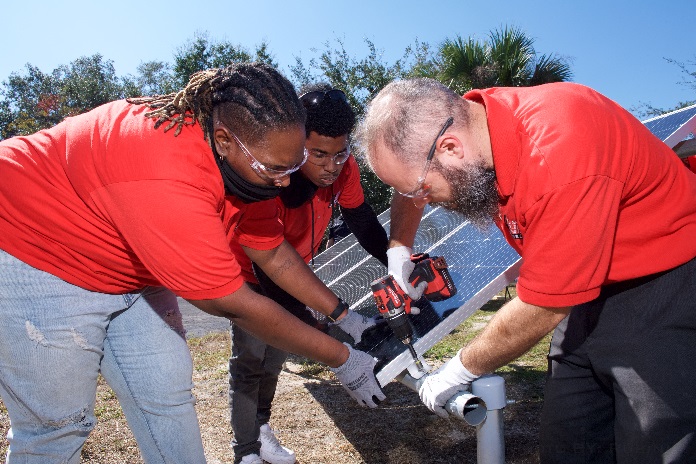
Weekend Classes Now Available!
Weekend classes are now available for Tulsa Welding School’s Electrical Applications program at our Houston and Jacksonville campuses! Designed for busy students balancing work or other commitments, this flexible option lets you train for a future in the electrical field without disrupting your weekday schedule. Take the next step toward a hands-on career—on your time
Employment is Expected to Grow for Electricians in the US by 80,200 Jobs by 2033!i
Flexible Class Schedules
Morning, Afternoon, Evening & Weekend Classes Available
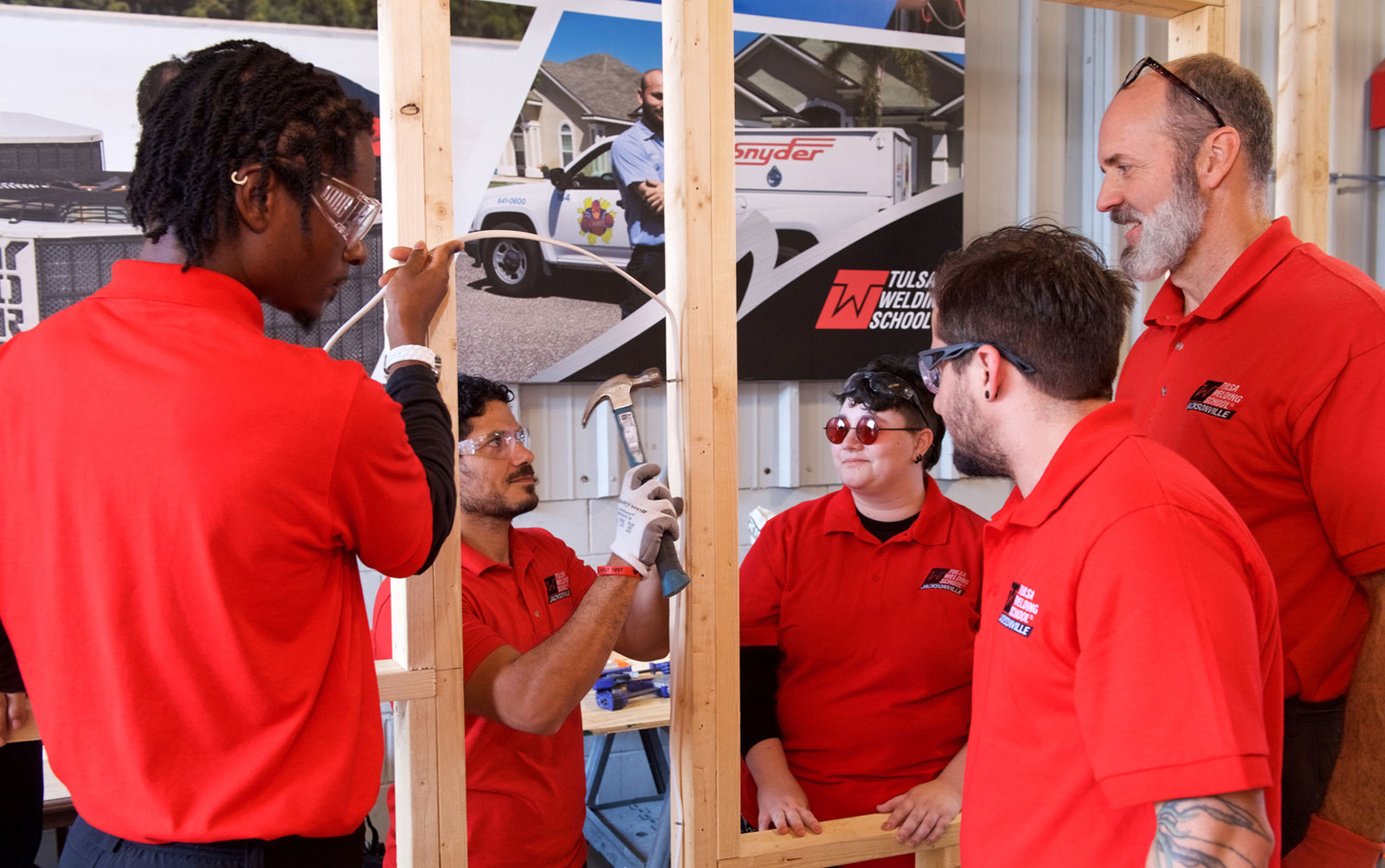
TWS offers flexible schedules whether you are just graduating from high school, changing your career, or transitioning from military to civilian life. Electrician classes schedules range from morning, afternoon and evening, depending on the campus location.
We work hard to find the right program and the right schedule to help you succeed. Contact us for more information on upcoming class times and start dates for the Electrical Applications program.
Electrical Applications Class Start Dates
Tulsa, OK Class Schedules (Mon - Fri)
- Morning 7:30am-12:30pm
- Afternoon 1:00pm-6:00pm
- Evening 6:30pm-11:30pm
Houston, TX Class Schedules (Mon - Fri)
- Morning 7:00am-12:00pm
- Afternoon 12:45pm-5:45pm
- Evening 6:30pm-11:30pm
- Weekend (Sat) 8:00am-6:00pm
Jacksonville, FL Class Schedules (Mon - Fri)
- Morning 7:30am-12:30pm
- Afternoon 12:45pm-5:45pm
- Evening 6:00pm-11:00pm
- Weekend (Sat) 8:00am-6:00pm
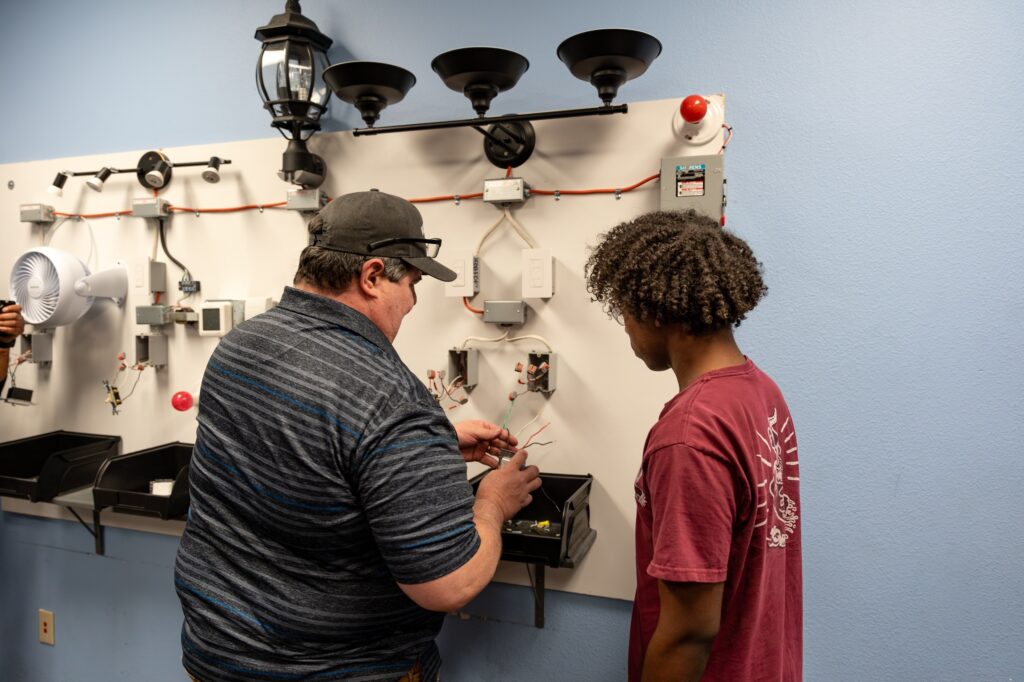
HYBRID INSTRUCTION
At TWS, we know you’re here to build real-world skills, not spend endless hours in a classroom. That’s why we offer a flexible online hybrid model, allowing you to complete the theoretical parts of your program online, as long as it’s done by the deadline. When you’re on campus, your time is spent where it counts: hands-on in the lab with tools, equipment, and expert instructors.
This approach gives you the freedom to balance school with other responsibilities, while still getting the hands-on training you need for a successful career in the skilled trades.

Experiences & Opportunities
Resources for TWS Students
Virtual Tour
Take a virtual tour of our campuses! Explore the classrooms, labs and shop floor with our unique interactive experience.
Employer Relationships
TWS has relationships with major employers across the United States. Our dedicated Career Services team will be there to support you every step of the way after graduation.
The Right Tools for the Job
When you begin your education at TWS, we provide you with an extensive gear package. You get the high quality professional tools you need to succeed. Ask your Admissions Representative for more information about the gear package for your program.
Scholarship Opportunities
Learn more about what scholarship opportunities are available and how you might qualify for one. Start the process of applying for a scholarship today!

Ready to Move Forward?
All it takes to move forward is making that first step. Whether you need more information, schedule a tour or want to speak to someone, we’re with you every step of the way.
Are YOU ready to change your life?
Listen to these TWS graduates who changed theirs.
We all come from different walks of life, and different circumstances, but it’s the hard work we do and the blood sweat and tears put in to make us who we are today.
Tulsa Welding School gave these graduates the structure, confidence, and guidance they needed to make a difference in their lives. It only takes one decision to start the journey on a path towards a better career. A better Life.
Hear the stories of these TWS graduates and how they changed their lives:
Jonathan Garza
Coming from a place of darkness and addiction, Jonathan made the change he needed to get his life back on track for his family, career, and his stability. Professional Welding Graduate from our Houston campus - Hear his story on how TWS changed his life.
David Mclean
With so many options in front of him and no clear path ahead, David chose to invest in his life and make the decision to enroll at a trade school. TWS gave him the opportunities to be the best version of himself he could be. Professional Welding Graduate from our Jacksonville campus - Hear his story on how TWS changed his life
Cody Hudgens
Not basing his chances on luck, Cody took the opportunity of becoming a welder in his own hands after serving in the United States Marine Corps. TWS gave him the knowledge and skills he needed to take his passion to the next level. Professional Welding Graduate from our Tulsa campus - Hear his story on how TWS changed his life
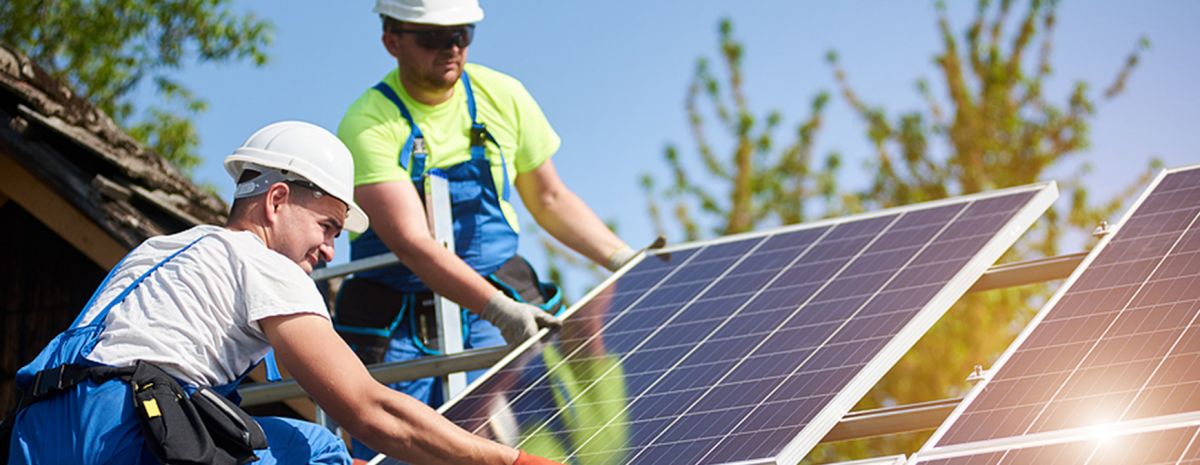
Program Courses for Electrical Applications
Fundamentals of Electricity
HVE100
This course provides students with a basic understanding of electricity. Instructors will teach schematic wiring, test meter usage and safety processes for handling electrical systems. Students will work with dual voltage systems commonly found in HVAC/R equipment and learn about control circuit wiring and high voltage wiring.
Requirements
- 4 Semester Credit Hours
- 90 Lecture Hours
- 10 Lab Hours
- 100 Total Contact Hours
- 14.5 Outside Prep Hours
Fundamentals of Solar
HVE110
This module provides an overview of photovoltaic (PV) science and an introduction to the fundamentals of solar energy.
Through a combination of lecture, problem-solving and hands-on lab exercises, students will learn the concepts and processes of photovoltaic systems, including their design and installation.
The module covers the scope of solar energy systems’ conceptual, mechanical and electrical design, with an emphasis on wiring and electrical issues.
Requirements
- 4 Semester Credit Hours
- 50 Lecture Hours
- 50 Lab Hours
- 100 Total Contact Hours
- 10 Outside Prep Hours
Electrical Wiring – Residential
HVE120
This course introduces the most current version of the National Electrical Code Book to the students as a guide throughout the class.
The primary goal of the program is to teach basic techniques of Residential wiring from the standpoint of interpreting all code book requirements.
Students will put into practice all that they have learned by wiring a scaled down three bedroom home. A study of electrical safety is provided to ensure a complete understanding of hand tools, ladders, shock hazards, and the personal protective equipment required to work in this field. They will be required to safely place all wiring, circuits, switches, receptacles, lighting fixtures, and GFCI devices in the trainer according to the electrical code.
Requirements
- Prerequisite Course(s): HVE100
- 4 Semester Credit Hours
- 50 Lecture Hours
- 50 Lab Hours
- 100 Total Contact Hours
- 15 Outside Prep Hours
Electrical Wiring – Commercial
HVE130
The Commercial wiring course follows through with concepts learned in the Residential wiring course of training, delving deeper into the National Electrical Code book.
Students will be tasked with code book interpretation through the study of load calculations, blueprint reading, cost estimating, three-phase motor wiring, and conduit manipulation.
Students will wire commercial lighting and three-phase motors as they research the required applications. A mock commercial building will be wired by students in accordance with applicable code, using conduit to protect their wiring.
Requirements
- Prerequisite Course(s): HVE100
- 4 Semester Credit Hours
- 50 Lecture Hours
- 50 Lab Hours
- 100 Total Contact Hours
- 20 Outside Prep Hours
Smart Home Technology & Advanced Wiring
HVE140
This course follows through with the knowledge built in Electrical Wiring – Commercial, with continued instruction in conduit bending up to 6” trade size using hydraulic bending equipment. This class explains the proper selection of pull boxes and junction boxes, the factors involved in conductor selection and calculations, the proper techniques for conductor installations, as well as the various applications necessary for conductor terminations and splices.
Students will continue to advance in their ability to calculate load requirements for branch and feeder circuits in keeping with current standards of the National Electrical Code. This class will also introduce the installation of various voice, data, and video cabling systems.
Requirements
- Prerequisite Course(s): HVE100 & HVE130
- 4 Semester Credit Hours
- 60 Lecture Hours
- 40 Lab Hours
- 100 Total Contact Hours
- 15 Outside Prep Hours
Motors & Lighting Practices
HVE150
This class elaborates on the characteristics of Alternating Current, explaining the behavior of electricity and how it functions in the application of motors, lighting, and the devices that control them.
Students will learn the differences between DC and AC motors, single phase and three phase applications, calculating the proper sizing of motors, and the selection of the motor controller as well as
overload protection. This class also covers the characteristics of light, the handling and installation of various types of lighting (incandescent, fluorescent, high intensity discharge, LED), and the controls used in their operation.
Requirements
- 4 Semester Credit Hours
- 60 Lecture Hours
- 40 Lab Hours
- 100 Total Contact Hours
- 15 Outside Prep Hours
Electrical Distribution Systems (EA)
HVE160
This class will describe the operating characteristics of various types of transformers. Using the National Electrical Code, students will calculate transformer sizes for various applications. This module describes the purpose of switchgear, its construction, and maintenance.
In this class, students will also understand the importance of overcurrent protection, describe the various types of fuses and circuit breakers in the industry, and select the proper size for specific applications, as well as conduit bending.
Students will also apply their knowledge of the proper methods for grounding and bonding according to the requirements of the NEC. This class describes the wiring methods for specific hazardous locations, and also introduces the installation of cable tray systems.
Requirements
- 4 Semester Credit Hours
- 60 Lecture Hours
- 40 Lab Hours
- 100 Total Contact Hours
- 15 Outside Prep Hours


Students Get a Meta Quest 2 loaded with Access to Interplay Virtual Reality Training!
Train anywhere. Anytime.
Students of the Electrical Applications Training program will have the Interplay Learning virtual reality training simulator available to enhance skills learned. Interplay simulates the experience of Electrical, HVAC training via VR to help students learn troubleshooting techniques, even when they’re away from school. A Meta Quest 2 is part of the gear package for this program, and Interplay Learning is included as part of the course materials for all students.
Student Reviews
Pain
Electrical Applications
Comprehensive Curriculum & Knowledgeable Instructors.
Attending Tulsa Welding School was a great experience that provided me with hands-on training and industry-relevant skills. The Electrical Applications program, in particular, taught me a lot about electrical systems, wiring, and safety protocols. The instructors were knowledgeable, and the curriculum was comprehensive, covering both theory and practical applications. This program has equipped me with the confidence and expertise needed to excel in the field.
Ale Perez
Electrical Applications
Fantastic experience in the Electrical Program
I recently completed the Electrical program at Tulsa Welding School, and I had a fantastic experience from start to finish. The program was well-structured, and I learned a great deal that I can directly apply to my career in the electrical field. A special shout-out to Mr. Sullivan, who was an outstanding instructor. He was incredibly knowledgeable about the material and always made himself available to answer questions. His respectful and approachable attitude created a positive learning environment for all the students, making it easier to stay motivated and engaged. Overall, I highly recommend this program to anyone looking to build a solid foundation in electrical work. The hands-on training and supportive staff made it an experience I won’t forget.
My Name
Electrical Applications
The course work was easily learned and applied
I attended the Electrical program at Tulsa Welding School. I had a great experience throughout my time there. The Instructors were extremely approachable and able to answer any question I had. The course work was easily learned and applied. Being able to use the Oculus to do course work made the hands on portions follow you home.
Aldair Hernandez
Electrical Applications
I highly recommend TWS for anyone looking to pursue a career in electrical work
I’m about to complete the electrical program here and what I can say is that the instructors were knowledgeable and supportive, providing hands-on training that prepared me well for the field, especially in professor Sullivans class. The curriculum was comprehensive, covering everything from basic principles to advanced techniques. The facilities were top-notch, with modern equipment and ample resources for learning. I appreciated the smaller class sizes, which allowed for personalized attention and mentorship. Overall, I highly recommend TWS for anyone looking to pursue a career in electrical work. It’s a fantastic place to gain the skills and knowledge needed for success in the industry

